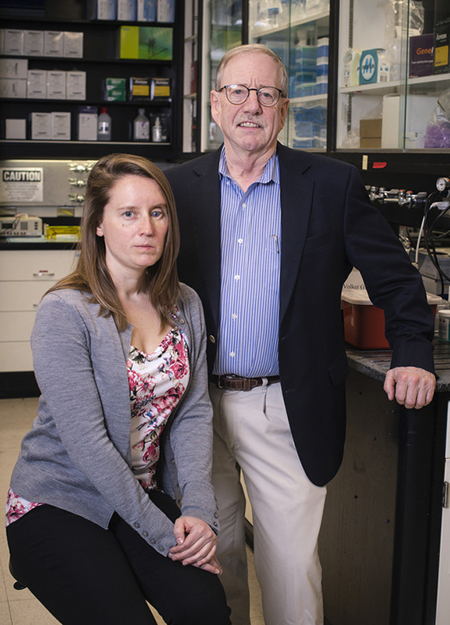University of Alabama at Birmingham Jessica Hoffman, Ph.D., and Steven Austad, Ph.D. aging expert — and once-upon-a-time lion trainer — Steven Austad, Ph.D., and UAB postdoctoral fellow in longevity research Jessica Hoffman, Ph.D., have won the George C. Williams prize from the International Society for Evolution, Medicine and Public Health, or ISEMPH.
Jessica Hoffman, Ph.D., and Steven Austad, Ph.D. aging expert — and once-upon-a-time lion trainer — Steven Austad, Ph.D., and UAB postdoctoral fellow in longevity research Jessica Hoffman, Ph.D., have won the George C. Williams prize from the International Society for Evolution, Medicine and Public Health, or ISEMPH.
The prize includes a $5,000 honorarium and an expense-paid trip to the ISEMPH Fifth Annual Meeting in Zurich, Switzerland, this summer.
“She gets the paid trip,” Austad said of his postdoc Hoffman. “I told her she can have the money if I can have the plaque.”
The prize recognizes the best paper published in the journal Evolution, Medicine and Public Health in 2018. It commemorates noted evolutionary biologist George Williams, who wrote perhaps the most influential paper in the evolutionary biology of aging in the 20th century, “Pleiotropy, Natural Selection, and the Evolution of Senescence.”
In Williams’ 1957 paper, he proposed that antagonistic pleiotropy undergirded the evolution of senescence. The words antagonistic pleiotropy may sound daunting, but they explain a simple concept — a change in one gene that differentially affects two traits of an organism, one for the better and one for the worse. In aging, antagonistic pleiotropy refers to healthful effects of a gene early in life but harmful effects in later life.
In their prize-winning paper last year, Austad and Hoffman described the genetic evidence that has accumulated since Williams’ mid-century hypothesis. Trade-offs between early life fitness and late life mortality are common, they say, and perhaps ubiquitous.
They showed examples from fieldwork where wild animals show a negative relationship between reproduction rates early in life and extended lifespan. Although the genetic bases of these examples in vertebrates have not been determined, the longer lifespan comes at the cost of lower fecundity early in life, and that means being dealt a losing card in the contest of evolution.
For lab organisms, many mutations are known that extend lifespan. Those also examined for antagonistic pleiotropy commonly show a diminished early life fitness that makes them unable to compete — on the evolutionary scale — with wild-type organisms.
For example, a particular mutation in the nematode C. elegans that doubles lifespan also decreases reproduction by one-fifth. When worms with this mutation compete with wild-type worms, they become extinct within a handful of generations.
Austad and Hoffman listed similar examples in their paper for fruit flies and mice.
“From current evidence,” they wrote, “antagonistic pleiotropy is somewhere between very common or ubiquitous throughout the animal world. Whenever an allele or new mutation is discovered to extend life, some detrimental effect on early life fitness is almost always observed. This explains why longevity alleles are not favored in wild populations.”
But that contrasts with the current field of aging research in humans. Here, the desire is to remain healthy and reach a longer lifespan, which antagonistic pleiotropy suggests are mutually exclusive. This research is on the verge of major advances to extend longevity, they say; but the medical interventions used to prolong human health would likely be made later in life. “Thus, evolutionary biology,” they said, “does not preclude the possibility of medical interventions in the aging process.”
As well as interesting research, Austad and Hoffman have interesting backgrounds.
Austad graduated with a degree in English literature and worked as a reporter, taxi driver and wild animal trainer. Training lions for movies awakened his interest in earning a Ph.D. degree in biology. He turned to the biology of aging only after extensive fieldwork in the United States, South America, Africa and islands of the west Pacific. His 1997 book, “Why We Age,” was translated into eight languages.
Hoffman graduated summa cum laude from Clemson University, where she wrote her honors thesis on the predator-prey relationship between the northern striped dogwinkle sea snail and acorn barnacles. Her current research interests include the different metabolic pathways associated with age.
Austad is distinguished professor and chair of the Department of Biology in the UAB College of Arts and Sciences. He also directs of the UAB Nathan Shock Center of Excellence in the Basic Biology of Aging.
